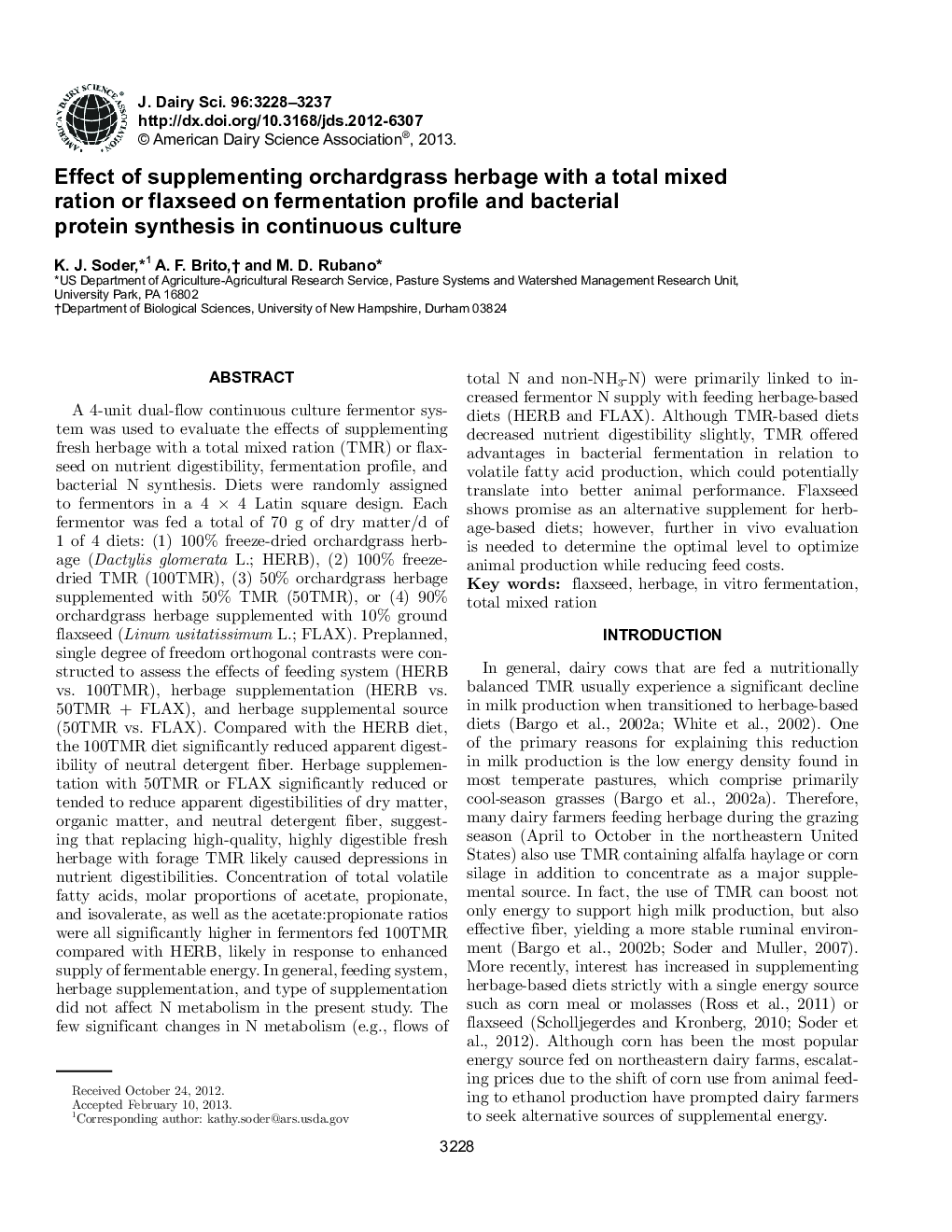| کد مقاله | کد نشریه | سال انتشار | مقاله انگلیسی | نسخه تمام متن |
|---|---|---|---|---|
| 10978461 | 1108057 | 2013 | 10 صفحه PDF | دانلود رایگان |
عنوان انگلیسی مقاله ISI
Effect of supplementing orchardgrass herbage with a total mixed ration or flaxseed on fermentation profile and bacterial protein synthesis in continuous culture
ترجمه فارسی عنوان
تأثیر مکمل گیاهان زراعی سبز با کل جیره مخلوط شده و یا دانه کتان بر روی پروتئین تخمیر و سنتز پروتئین باکتریایی در کشت مداوم
دانلود مقاله + سفارش ترجمه
دانلود مقاله ISI انگلیسی
رایگان برای ایرانیان
کلمات کلیدی
موضوعات مرتبط
علوم زیستی و بیوفناوری
علوم کشاورزی و بیولوژیک
علوم دامی و جانورشناسی
چکیده انگلیسی
A 4-unit dual-flow continuous culture fermentor system was used to evaluate the effects of supplementing fresh herbage with a total mixed ration (TMR) or flaxseed on nutrient digestibility, fermentation profile, and bacterial N synthesis. Diets were randomly assigned to fermentors in a 4Â ÃÂ 4 Latin square design. Each fermentor was fed a total of 70Â g of dry matter/d of 1 of 4 diets: (1) 100% freeze-dried orchardgrass herbage (Dactylis glomerata L.; HERB), (2) 100% freeze-dried TMR (100TMR), (3) 50% orchardgrass herbage supplemented with 50% TMR (50TMR), or (4) 90% orchardgrass herbage supplemented with 10% ground flaxseed (Linum usitatissimum L.; FLAX). Preplanned, single degree of freedom orthogonal contrasts were constructed to assess the effects of feeding system (HERB vs. 100TMR), herbage supplementation (HERB vs. 50TMR + FLAX), and herbage supplemental source (50TMR vs. FLAX). Compared with the HERB diet, the 100TMR diet significantly reduced apparent digestibility of neutral detergent fiber. Herbage supplementation with 50TMR or FLAX significantly reduced or tended to reduce apparent digestibilities of dry matter, organic matter, and neutral detergent fiber, suggesting that replacing high-quality, highly digestible fresh herbage with forage TMR likely caused depressions in nutrient digestibilities. Concentration of total volatile fatty acids, molar proportions of acetate, propionate, and isovalerate, as well as the acetate:propionate ratios were all significantly higher in fermentors fed 100TMR compared with HERB, likely in response to enhanced supply of fermentable energy. In general, feeding system, herbage supplementation, and type of supplementation did not affect N metabolism in the present study. The few significant changes in N metabolism (e.g., flows of total N and non-NH3-N) were primarily linked to increased fermentor N supply with feeding herbage-based diets (HERB and FLAX). Although TMR-based diets decreased nutrient digestibility slightly, TMR offered advantages in bacterial fermentation in relation to volatile fatty acid production, which could potentially translate into better animal performance. Flaxseed shows promise as an alternative supplement for herbage-based diets; however, further in vivo evaluation is needed to determine the optimal level to optimize animal production while reducing feed costs.
ناشر
Database: Elsevier - ScienceDirect (ساینس دایرکت)
Journal: Journal of Dairy Science - Volume 96, Issue 5, May 2013, Pages 3228-3237
Journal: Journal of Dairy Science - Volume 96, Issue 5, May 2013, Pages 3228-3237
نویسندگان
K.J. Soder, A.F. Brito, M.D. Rubano,
